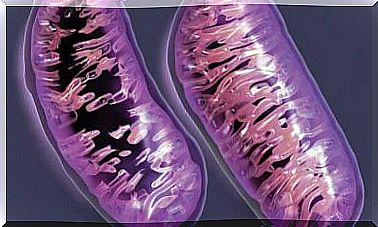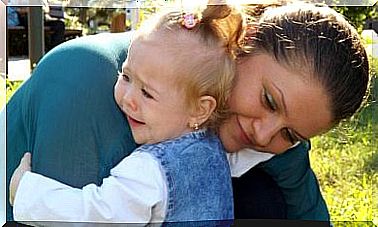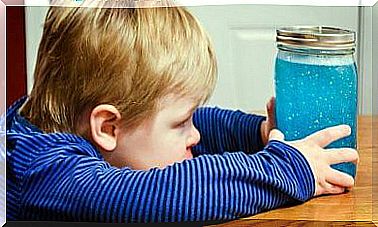What Causes Flaky Skin In Newborns?

A newborn’s skin is extremely delicate and will continue to change in the first few weeks of life. The skin may peel and peel off, which shouldn’t alarm parents. This is normal. But if you’re wondering what causes flaky skin in newborns, then you should read on.
Certainly, flakes and flakes of skin can show up on any part of the body in newborns. However, they are particularly common on the hands, soles of the feet, and ankles. This happens because babies lose the outer layer of skin for the first two or three weeks after they are born.
The amount of flakes on the skin can also vary. Often this depends on whether the baby was born prematurely. In other cases, the flaky skin may appear as a result of other conditions that should be treated.
However, some degree of dry skin after childbirth is completely normal and usually goes away on its own. In general, this does not require any particular caution on your part.
Causes of flaky skin in newborns
If your baby’s skin appears very dry or begins to peel in the weeks after it is born, knowing what is causing it may reduce your worries. Some of the causes could be:
1. Ichthyosis
One of the causes can be a genetic condition called ichthyosis. It causes peeling and dryness of the skin. This skin condition also leads to flaking, itching, and peeling of the skin.
Your pediatrician can determine this condition based on your family’s medical history and after a physical exam on your child. The doctor may also take blood or skin samples during this exam.
There is no cure for ichthyosis, but using creams regularly will relieve dryness and improve the condition of your baby’s skin.
2. Eczema
In some cases, the peeling and dry skin are caused by a skin condition called eczema or atopic dermatitis. The eczema can cause dry, red, and itchy patches on the baby’s skin.
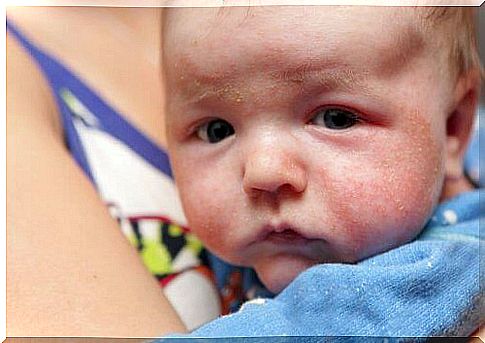
This condition does not usually appear immediately in the postnatal period, but it can develop later in childhood. The exact cause is still unknown, but researchers believe several factors can trigger an outbreak. This includes when you are exposed to certain irritants that are found in shampoos and detergents.
Tips for reducing flaky skin in newborns
If your child is feeling uncomfortable because their skin is flaking, the most important thing is to alleviate the discomfort. Besides this kind of care, the love and special attention of mother and father will help most.
Here are some tips you can use to reduce flaky skin in babies:
1. Hot water baths
Hot water dries out the skin of people of all ages, including newborns. Therefore, if your baby has flaky skin, don’t use hot water.
Warm water baths, on the other hand, are ideal for the sensitive skin of a newborn. Always follow the specific recommendations for newborn hygiene.
The number of flakes on the skin can vary. This often depends on whether the birth was too early, on the calculated date, or late.
2. Use baby shampoo to reduce flaky skin in newborns
To prevent the skin from peeling, bathe your newborn only with a specially formulated baby shampoo. The soap you use on your own skin is likely too harsh for a baby’s delicate skin.
3. Use a humidifier
Using a humidifier at home can make a difference in how you treat your baby’s skin. Humidifiers increase the amount of moisture in the air, which helps treat and prevent flaky skin.
And it’s also very easy: place the humidifier in the room where the baby spends most of the time. Then let it run for a few hours if the air feels a little dry.
4. Limit bath time
Baths can negatively affect your newborn’s skin. Long periods of time in the bath water can wash out the natural oils in the skin and make your baby more prone to peeling. Therefore, reduce bath time. That way, you should be able to tell a difference in your baby’s skin quickly.
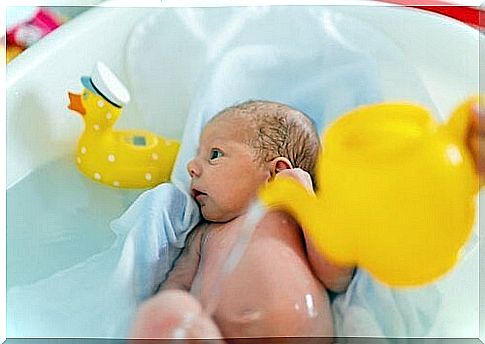
5. Keep your baby hydrated
Maintaining a constant water level in the body is imperative. Therefore, strictly adhere to the established routine for breastfeeding or feeding baby food and avoid skipping meals. Feeding provides hydration and helps rehydrate the skin.
Finally, remember that flaky skin is normal in newborns . So don’t worry too much. And just in case, this list will tell you about the possible causes and you can provide your baby with appropriate remedial measures and take good care of them.





